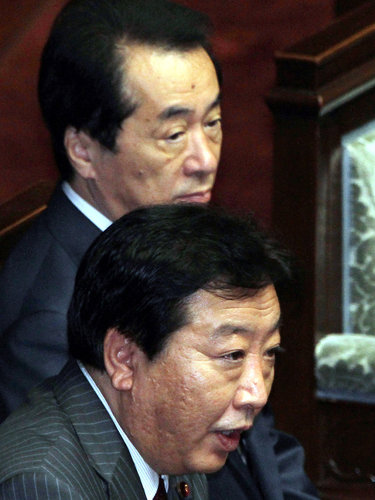You are here
by Hiroko Tabuchi - The New York Times - August 30, 2011

Haruyoshi Yamaguchi/Bloomberg News
Yoshihiko Noda, below, the new prime minister of Japan, and Naoto Kan, the outgoing leader.
TOKYO — Yoshihiko Noda, a down-to-earth fiscal conservative, was elected prime minister by the Japanese Parliament on Tuesday in the sixth change of leaders in five years, a period of mounting economic and social challenges to the world’s third-largest economy.
Mr. Noda, the finance minister under the outgoing prime minister, Naoto Kan, takes the post with Japan fighting to recover from a devastating earthquake, tsunami and nuclear disaster in March, on top of an economy weakened by persistent deflation, the recent global economic turmoil and growing concerns over the country’s burgeoning debt.
In his previous role, he orchestrated multiple interventions in currency markets to weaken a strong yen that has battered Japanese exporters.
The son of a paratrooper in the Japanese Self-Defense Force, Mr. Noda had kept a relatively low profile within the Democratic Party. Now 54, he is known for a steady hand in policymaking, as well as self-deprecating jokes: in a speech before Monday’s ballot, he compared himself to a loach, an eel-like, bottom-feeding fish with whiskers.
Mr. Noda outmaneuvered more prominent rivals in an internal party ballot on Monday, making him leader of the Democratic Party, which has been plagued by internal feuding. He has called for unity and is expected to distribute cabinet and party posts to competitors as well as allies to underscore his conciliatory approach.
He will take several days to form a cabinet, with his formal appointment by Emperor Akihito expected as early as Friday.
Mr. Noda faces a gridlocked Parliament, where opposition parties have used their control of the legislature’s upper chamber to block Democratic Party policies. The Liberal Democratic Party, ousted by the Democrats in 2009, has harshly accused the outgoing administration of muddling the response to the natural and nuclear disasters.
“There has been so much delay over the past months,” Nobuteru Ishihara, the secretary-general of the Liberal Democratic Party, told the public broadcaster NHK after Mr. Noda’s selection in Parliament. “Mr. Noda must make up for that delay.”
Mr. Noda will have to immediately compile a third supplemental budget to pay for the country’s recovery from the March disasters. The outgoing administration has said that reconstruction will cost the government at least $169 billion over the next five years As a fiscal conservative, he is one of few within his party to suggest that raising taxes might be necessary to rein in Japan’s deficit. Others in his party argue that such a move is dangerous at a time of economic weakness.
Still, he has suggested that he will chart a more flexible approach to dissenting voices within his own party and in the opposition.
Mr. Noda “will most likely temper his fiscally hawkish stance, which other candidates were loath to espouse, even as he champions an eventual return to fiscal responsibility,” Naomi Fink, a Tokyo-based strategist at the investment house Jefferies, said in a note. Masaaki Kanno, Japan economist for JPMorgan Securities, said Mr. Noda was likely to be “flexible on policymaking” and had no option but to prioritize the reconstruction budget over tax-increase plans, given the scale of the recent disasters.
The leader of the Japan Business Federation, the country’s largest business lobby, has called Mr. Noda a “stable” political leader with a track record in finance and an “ability to take action.”
His foreign outlook is also hawkish. He openly expressed concern over China’s growing military might in a recent essay and seemingly absolving Japan’s wartime leaders of their actions, which drew protests from the country’s Asian neighbors.
He said he accepted the decision of past governments to accept guilty verdicts on Japanese war criminals convicted in a postwar tribunal. In a message congratulating Mr. Noda, China’s prime minister, Wen Jiabao, said he hoped for better ties between the two countries, especially after a territorial spat over disputed isles in the East China Sea last year.
Mr. Noda has said that he will stick to Mr. Kan’s promise to gradually phase out nuclear power, but that it remains necessary in the short term to prevent electricity shortages that could further cripple the economy.



Recent Comments